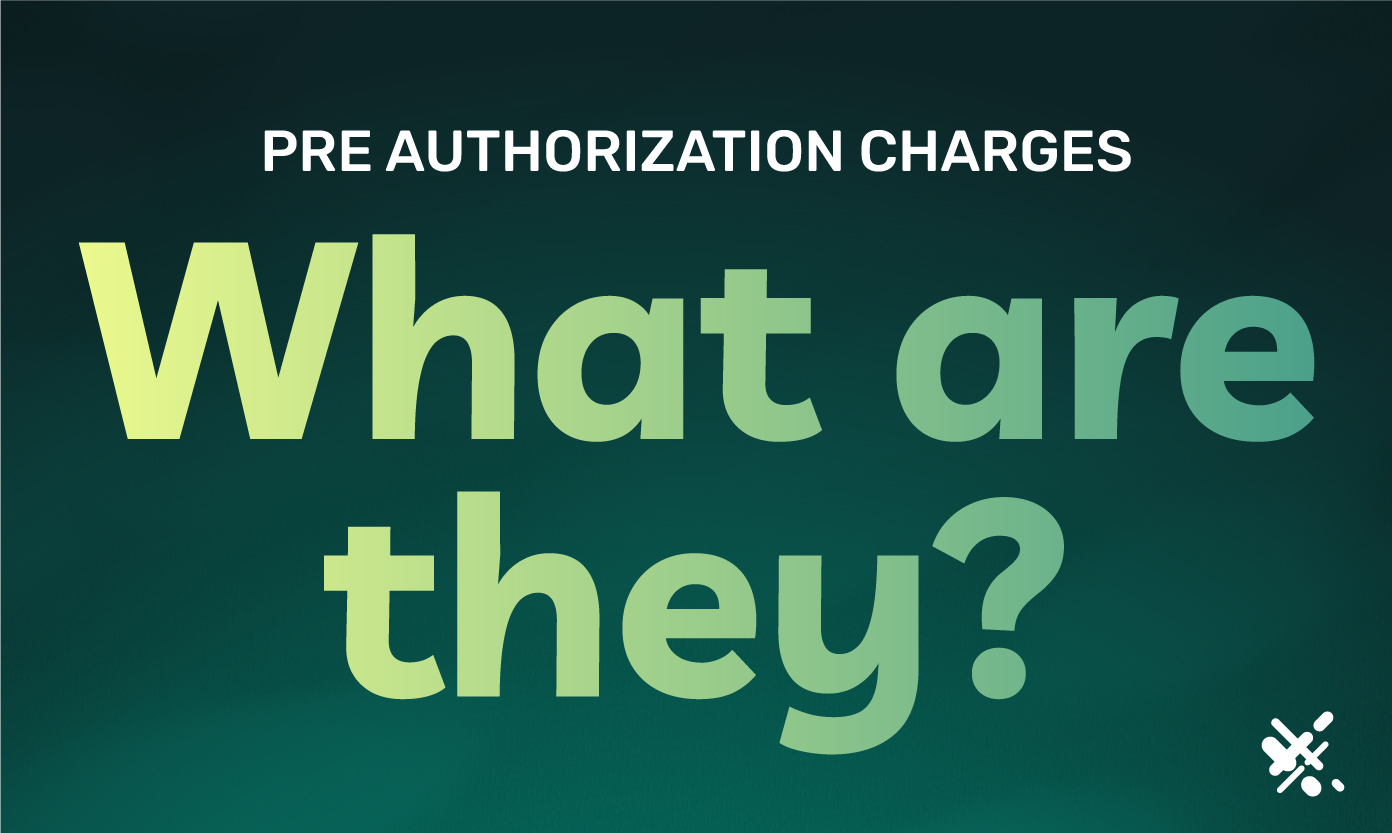Sometimes the final amount of a transaction is not known at the time of sale. And other times, a merchant wants to know that a customer has the money or credit they need to pay for something. That’s where a preauthorization charge comes into play.
What is a Preauthorization Payment?
A preauthorization charge allows a merchant to estimate the final cost of a product or service and request the customer’s bank or card issuer to put a hold on that amount on their account. This hold is temporary and will generally fall off on its own after seven days or less.
The exact number of days varies from business to business, as defined by merchant category codes or MCCs. Sometimes a preauth can linger for 31 days. But usually, a business will settle the affair much sooner than that, capturing the final amount or releasing the hold.
How Does a Preauthorization Charge Work?
All transactions involve authorization on a credit card. Authorization is the step in credit card processing where the card network works with the customer’s issuing bank to see that the customer has enough cash in their account or credit on their credit line to cover the cost of a transaction. If not, the payment gateway declines the transaction.
Capturing and settling the transaction are separate steps. However, most consumers are unaware of that because authorization, capturing, and settling happen “immediately.” Of course, they don’t really.
But the customer bank will reduce their account or credit line to reflect the charged amount. Meanwhile, settling the funds will occur on the back end, taking 24-48 hours (usually).
But again, what if the final amount is unknown? In these cases, the card networks and issuing banks will work together to verify the availability of funds. They will place an authorization hold on those funds to ensure they won’t go anywhere (e.g., be spent elsewhere by the customer or claimed by another merchant running a charge).
The merchant has a certain amount of time to finalize the transaction. This timeframe is based on their merchant category or merchant classification code (MCC).
The merchant should take proactive responsibility and finalize the transaction, even if it’s ultimately $0 (such as a hotel security deposit). The timely settlement will help avoid customer frustration. But if they don’t, the authorization hold will “fall off” on its own accord.
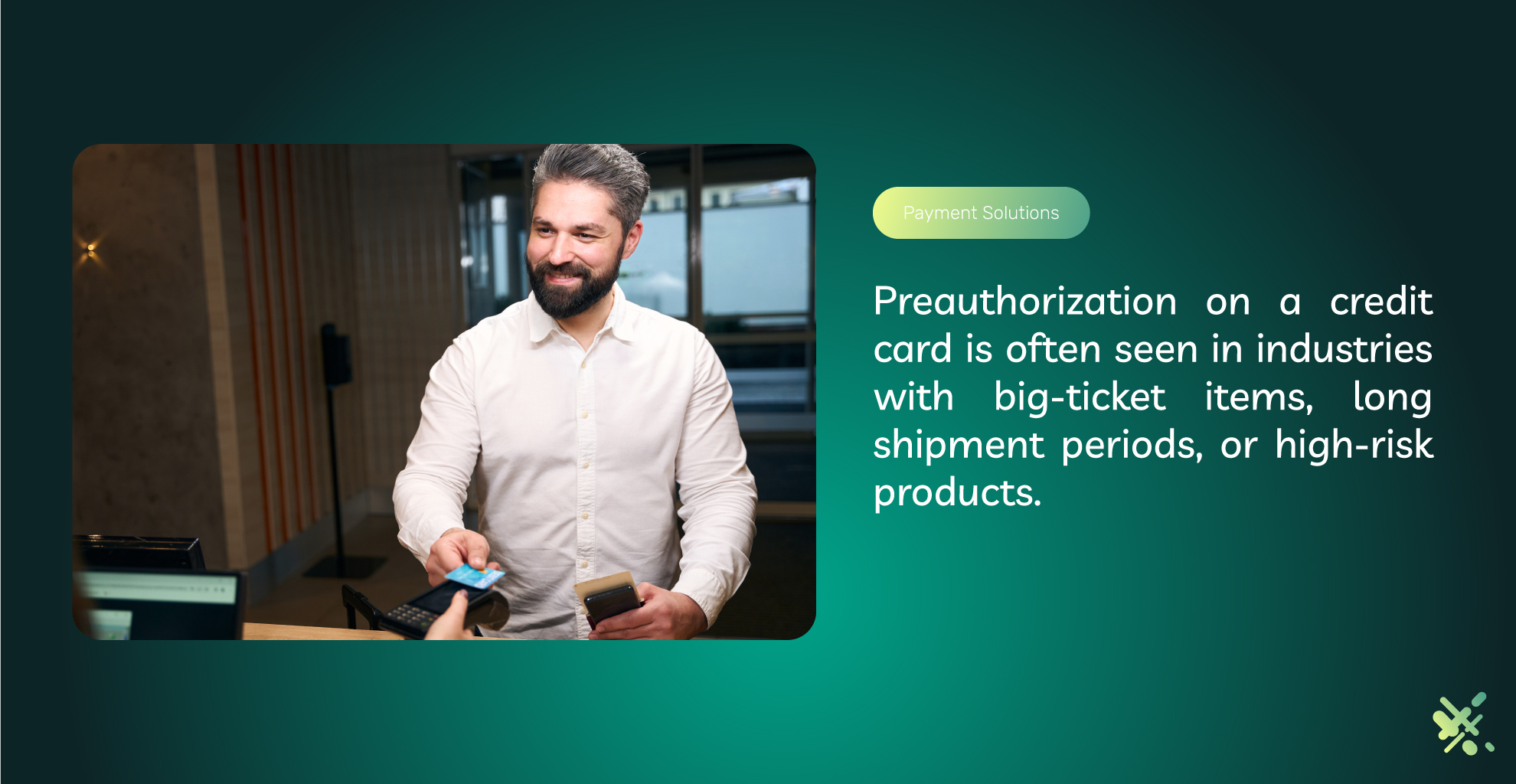
What Types of Businesses Should Preauthorize Credit Cards?
Keep in mind that one of the main reasons for a credit card preauthorization is to protect the merchant. A preauthorization charge can help the merchant recoup payment for any damages the customer might make while enjoying the products or services they’re paying for.
These damages are likely not built into the standard cost of whatever the merchant sells. That’s because they are perhaps uncommon, or putting this additional charge into the customer-facing price would make it too high. Still, if something unexpected does happen, the merchant needs to protect their revenue from surprise expenses.
That said, preauthorization on a credit card is often seen in industries with big-ticket items, long shipment periods, or high-risk products. It’s also a good payment processing strategy for businesses that want to avoid chargebacks.
Hotel Incidentals
Hotels issue a preauthorization charge for incidental expenses. These incidentals can include normative behaviors such as consuming overpriced food and alcohol from the mini-fridge (those $10 M&Ms seem more reasonable after downing a few $10 mini-bottles). But they can also include abnormal behaviors such as leaving behind a goat dressed like Abraham Lincoln or any other strange behaviors that require additional room service cleanup after checkout.
Incidentals can also include accidents and theft. A guest might accidentally take a towel home or help themselves to a bathrobe on purpose. After all, they are hard to leave behind once you try them on. The preauthorization charge can be amended to include any damages or items taken from the hotel room.
Preauths are not about covering fixed and known expenses like taxes and fees. In fact, in most states, these need to be disclosed to the booking party up front. They will become part of the final charge (or paid up front if the room itself is paid for upfront). But they are not going to be part of the preauth hold itself.
Rental Car Agencies
Rental car companies may also place authorization holds on a credit card. They do this to cover the cost of filling up the gas tank again. But they also do this to ensure they will get paid for the rental and cover any damages. Typically this charge will be 15-20% of the rental amount, which may also be charged upfront.
Gas prices have had most consumers upset these days. But renters will be even unhappier when they see how much they’re charged for empty tanks when they return their car. Most rental car companies are charging up to $10 per gallon today. In most places, that’s two or even three times the cost of filling up the tank yourself.
Car rentals are big-ticket items with a lot of inherent risks. Pre-authorized payments help mitigate some of this risk by ensuring a renter has the money to pay for gas or surprises.
The car might need cleaning if pet hair, vomit, or cigarette butts were involved in a rental (or all three). Detailing a car can cost up to $225 (or more), so preauthorizing ensures a renter can cover something like that if needed.
For more significant concerns (such as accidents), there is insurance. The preauthorization charge is really about making sure the customer can cover incidentals. And it’s also about making sure the business does not have to cover its cost.
Gas Stations
Gas stations are constantly dealing with customers who come and go. Some of these customers may never come back again. As such, the gas station owners want to make sure they will get paid.
That’s why they will put a preauthorization hold on credit and debit card payments at the pump. The exact amount may vary from station to station, but it’s generally anywhere from $1 up to $100.
The gas station does not know the final transaction amount, and they don’t know if you’ll have enough to cover it. They want to make sure you do have enough cash in your bank account or enough available credit on your credit limit to purchase a tank of gas.
Therefore, they may preauth around $50 from a customer’s account since that’s probably the same or more than a customer will need.
Pre auths or what helps a gas station determine if a customer has enough to pay for gas and how much they can pay for. The card issuer is the one who decides how long the preauthorization charge will last, and it’s generally less than 72 hours.
As of 2022, Visa and Mastercard increased the preauthorization charge limits by 40%, raising them from $125 to $175. Keep in mind that these are the upper limits, and the gas station sets its own amount (within that limit).
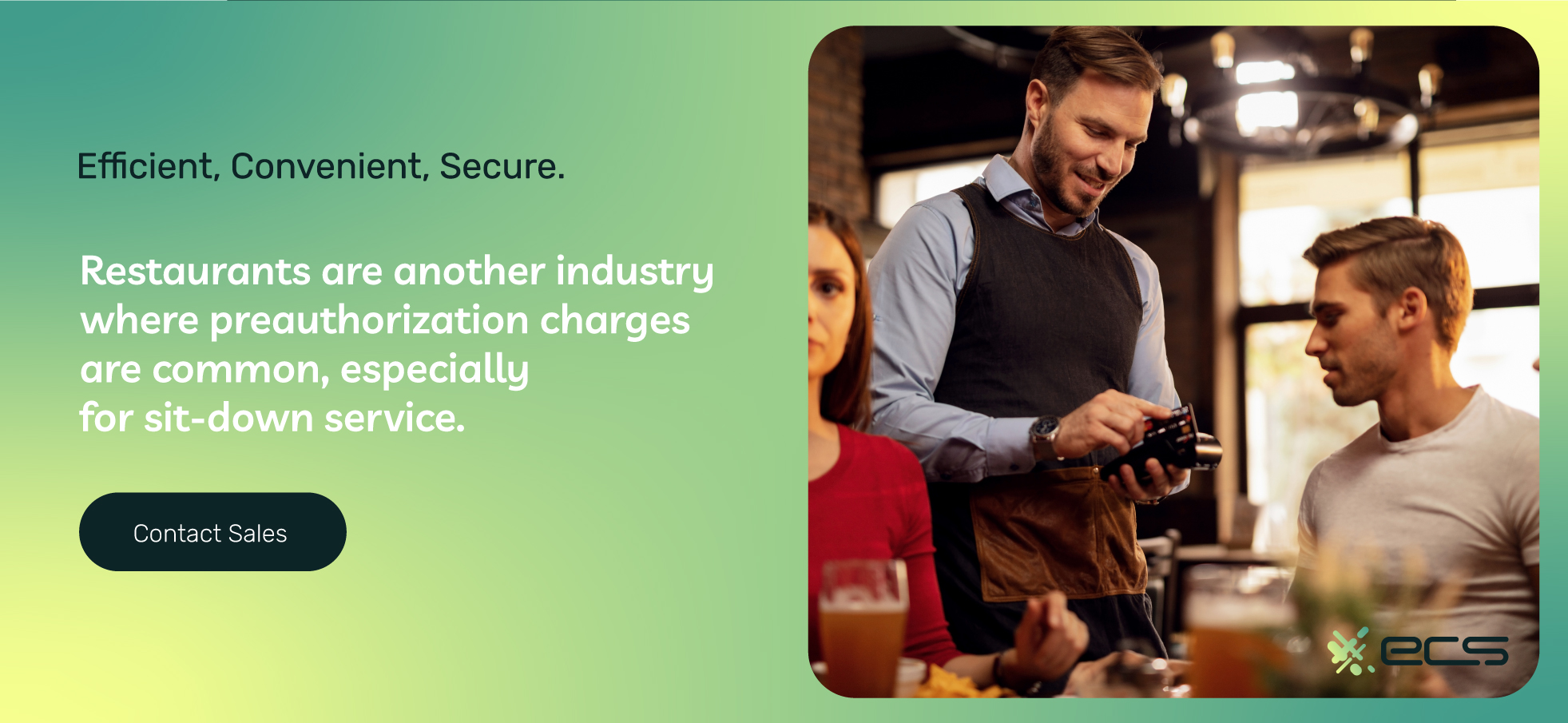
Restaurants
Restaurants are another industry where preauthorization charges are common, especially for sit-down service. It’s true that the price of everything is on the menu, except at places where “if you have to ask, you can’t afford it.” But what about the tip? Tips can vary based on the amount of the check, the service, and the diner’s generosity (or lack thereof).
This is a perfect example of preauthorization, as the final amount is not known. The restaurant does not need to ask you to run a separate charge for the tip. After you have handed over your card and signed the check, you have essentially authorized the restaurant to settle the final amount later. Your signature is meant to corroborate the tip amount on the receipt, so it’s clear the server did not write it in later.
When you return from the restaurant and check your banking app, you may see no charge at all (yet). You may see a charge for the meal itself without the tip. Or you may see that amount and a description that the final amount is pending. In all these cases, the card processors are facilitating a preauthorization charge for the final amount.
Some restaurants charge a mandatory gratuity. Legally, they are supposed to let their diners know about this upfront. This mandatory gratuity is not included in any additional amounts that will change the final bill. If a diner wants to add an extra tip on top of that mandatory gratuity, that is up to their discretion.
Healthcare
The healthcare industry can also use preauthorization charges. Typical insurance plans do not cover everything. The patient may be responsible for specific deductibles. However, the medical billing landscape is complicated, and final prices may be unknown until they are run through the various codes and channels.
Ultimately, an insurance company may return some money to the doctor or hospital that provided care. The patient may end up owing less out of pocket. But until that’s established, the healthcare facility in question may preauthorize a certain amount from the patient.
Healthcare providers must remember that there is a timeframe for finalizing a preauthorization charge. This timeframe creates some urgency around the medical billing process, which is easy to overlook with everything else going on in patient care.
Sometimes the billing process may exceed this timeframe because of back and forth with the insurance company about the patient and their condition. Remember that if a merchant needs to seek preauthorization again, they must contact the customer (in this case, the patient) again to give permission.
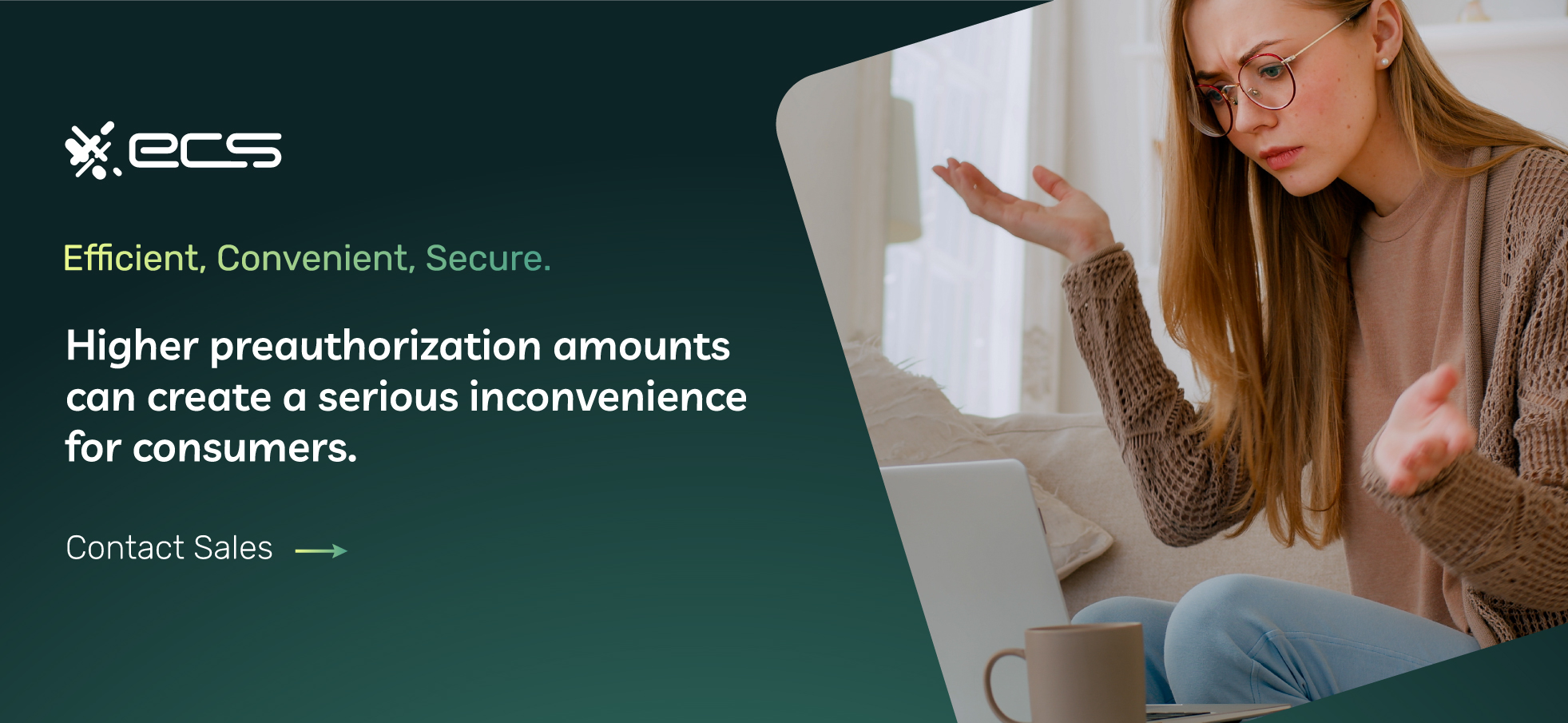
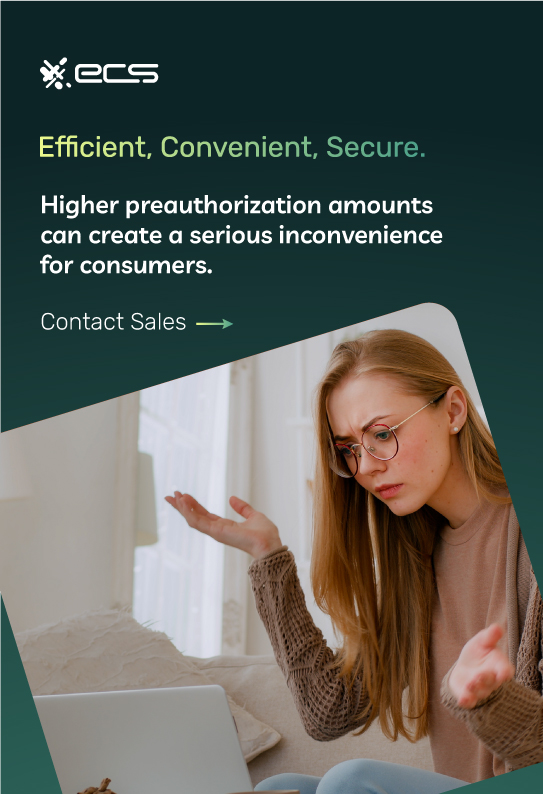
Why Do Consumers Hate Preauthorization Charges?
Most Americans live paycheck to paycheck because they just haven’t found that golden ticket to Willy Wonka’s Chocolate Factory (insert whatever underlying significance that metaphor carries for you). In fact, around 49% of Americans couldn’t cover a $400 emergency. That’s pretty dire when you think about it.
Need a new set of tires? An emergency trip to the vet? Surprise wedding invite? Broken appliance? Half of America does not have the resources to deal with these wrenches. So what’s that got to do with the price of rice? Which incidentally have jumped to two-year highs.
Preauthorization charges limit the available amount of cash in a checking account or credit on a credit line. Sometimes a preauth is just $1, which is fine except for most financially distressed consumers. Other times, a preauth is $50, $100, or $200.
Higher preauth amounts can create a serious inconvenience for consumers. With bills already needing to be paid (mortgage, rent, utilities, subscriptions), they are left with little immediate disposable cash for discretionary and even staple purchases, presenting an obvious inconvenience.
Don’t Shoot the Messenger
There are plenty of arrangements where consumers know what they’re getting into. When they check into a hotel, they know the hotel will charge them $50 or $100 for incidentals. However, if the preauthorization charge lingers on their account for 72, 48, or even 24 hours after their vacation has ended, they will be upset.
Most consumers assume that the merchant is at fault for the preauth lingering for so long. They may develop a negative perception of that merchant. Whether they call the merchant or their bank, they’ll be told that the hold is temporary, and nobody in a customer-facing role can tell them exactly when it will disappear. The 24-48 hours they’re told it will take for it to go away seem as distant as the moon.
As mentioned, the merchant is not responsible for the timeline of the preauth. But the customer may also be upset because the amount is not reflective of how much they actually spent. For sentence, they may see a preauthorization transaction of $60 at a gas station when they know they only spent $45. In a situation like this, is there anything a merchant can do?
Communicate Clearly and Consider Your Amounts
A merchant can establish clear signage about preauth amounts and timelines. For instance, signage at a gas station can say that consumer cards may be preauthorized for a fixed amount until the final price is adjusted and settled within 48 hours (or something similar), directing the customer to contact their bank if there are any problems.
However, this may not be enough. Hotels already do this and still experience a sizable amount of customer frustration. Guests know the hotel will charge $100 for incidentals. But if it takes more than 24 hours to go away, they can get upset.
Another consideration is the amount of the preauthorization charge. While you want to mitigate your risk, you don’t want to create a negative experience for your customer base. For instance, while Visa and Mastercard will allow gas station owners to preauth up to $175, this is probably a bad idea for most drivers. It may make sense for diesel pumps, but it will likely create significant problems for someone driving a four-door sedan or a minivan.
Is a Security Deposit a Preauthorization Charge?
A security deposit and a preauthorization charge are built on the same principle, but their particulars differ. For starters, the merchant collects a security deposit for the duration of their contractual relationship with the client.
A preauthorization charge is only collected by the merchant once they complete the transaction. In fact, part of it or all of it may never even be collected at all. It’s just there as a placeholder until the final amount is settled.
Sometimes deposits are not returned at all. They are collected for good and perhaps applied to the final purchase price. preauthorization charges only last a few days before the merchant settles the final amount. A renter’s deposit, by contrast, stays with the landlord until the renter moves out.
So ultimately, no, a deposit is not a preauth, even though they revolve around the same principles.
What Are the Benefits of Preauthorization Charges?
One immediate benefit is the reduction of chargebacks. A chargeback is when a customer files a dispute with their bank to avoid paying for something. A rising trend in “friendly fraud” is customers canceling these payments even if they have used a product or service.
Sometimes the customer will argue that someone in their household paid for it without the cardholder’s authorization (an example would be kids renting movies on Amazon). But other times, there will be some malignant intention on the part of the consumer.
Because laws around credit cards are so consumer-friendly (to protect them in part from predatory lending), it is tough for merchants to win chargeback disputes.
One industry impacted by friendly fraud is travel. Some customers are double-dipping by filing chargebacks and canceling their airfare with the airline simultaneously, leading to a double refund.
Some customers are booking airfare, hotels, and vacation packages and enjoying them before claiming a refund, either because they insist they didn’t go or because of a bad experience. This type of chargeback is like the diner in a restaurant who eats half their plate and then sends it back to the kitchen.
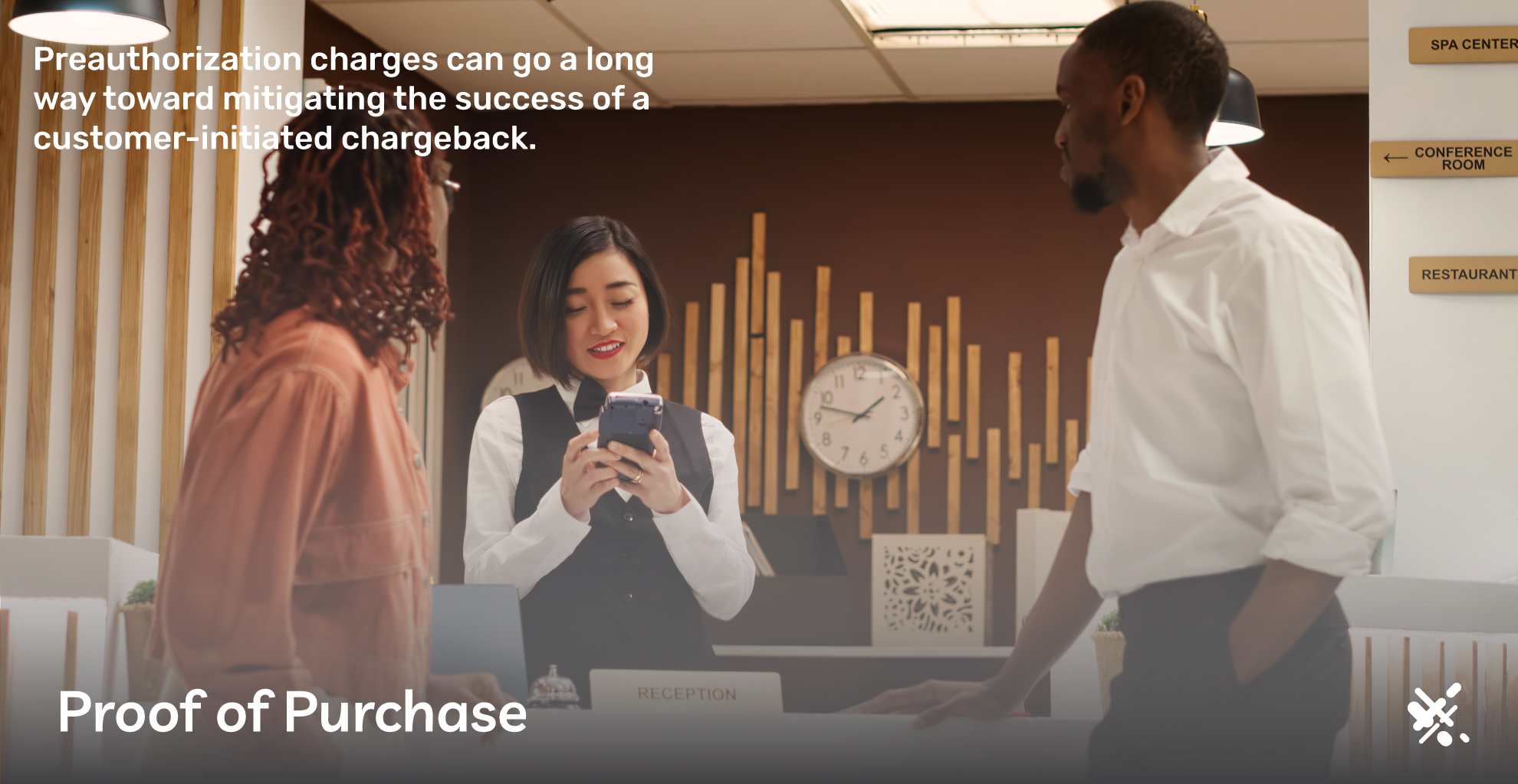
Preauthorization Charges as a Proof of Purchase
Preauthorization charges can go a long way toward mitigating the success of a customer-initiated chargeback. That’s because merchants can fight chargebacks with evidence that the customer willingly paid for the product or service.
Let’s take a preauthorization charge from a hotel as an example; when a hotel collects a preauth, that will linger on the account for the duration of the stay and then perhaps even 24-48 hours beyond that. The preauth is facilitated by a card present transaction since the guest needs to hand the card to the concierge when they check it.
The proof is very much in the pudding here, as they say. Or at the Four Seasons. Or wherever they stayed.
The merchant (the hotel) will point to the preauthorization charge and say something like, “Look…this customer claiming a chargeback authorized a charge, and the hold was on their account for one week.” When the customer’s bank sees a piece of evidence like this, they will reach out to the customer for further clarification.
Preauthorization Charges As a Fraud Prevention Tool
Remember that preauthorization charges are not finalized transactions. A preauth can give a merchant time to review a transaction and ensure it seems legitimate. Plenty of software-based fraud prevention tools are already in place within the payment ecosystem. But sometimes, a little manual review goes a long way.
Some retailers will use preauths as part of large purchases or with big-ticket items. Instead of automated transactions, they can perform manual reviews. The merchant can examine the card information, address, and purchase to see if it makes sense.
$65,000 of hot dogs and pizza delivered to the White House? Yup, it all checks out…although it certainly seemed strangely worded in those leaked emails.
Can You Cancel a Preauthorization Charge?
A merchant can cancel a preauthorization charge at any time. Unfortunately, this option is not available to the customer. They will have to contact the merchant to remove the hold, and the merchant will then have to remove it through their payment processor.
If the customer cancels the underlying payment for goods or services, the merchant must submit an authorization reversal immediately. This is similar to finalizing the transaction amount of the authorization were to culminate in capture and settlement.
Preauthorization Charges: A Wrap-Up
Preauthorization charges are a way for a merchant to ensure a customer has the sufficient funds available to pay for something. Sometimes, a preauth ensures a customer legitimately has a bank account or credit line to draw from.
Either way, it involves the merchant placing a hold on the customer’s account (for that amount) until the final tab is settled. Preauths are very useful in specific industries, primarily where the final transaction amount is unknown (restaurants, hotels, car rentals).
Preauthorization charges are also helpful for preempting chargebacks and avoiding fraud. It can give a merchant time to review a transaction and ensure it’s legitimate.
If you have any questions about preauthorization charges, how they work, or if your business would benefit from using them, contact us for further discussion.
Frequently Asked Questions About Pre Authorization Charges
Preauthorization charges help merchants to request a temporary hold on the customer’s account for an estimated charge a bit higher than the final cost of a service. Merchants can issue preauthorizations via their payment terminal. To learn more about how preauthorization charges work, contact ECS Payments.
Preauthorization charges help to safeguard high-dollar transactions and protect against chargebacks or insufficient funds after a service has been rendered. If you want to understand how to implement preauthorization charges for your business, contact ECS Payments for more information.
Preauthorization charges are commonly used in industries with big-ticket items, long shipment periods, or high-risk products, such as hotels and hospitality, car rentals, and eCommerce businesses. If you’re wondering if preauthorization charges are suitable for your business or need assistance in implementing them, contact ECS Payments.
Preauthorization charges can be a helpful tool in detecting potential fraud, reducing chargebacks, and verifying the validity of your customer’s intent to purchase. Contact ECS Payments for more ways to prevent fraud and chargebacks for your business.
